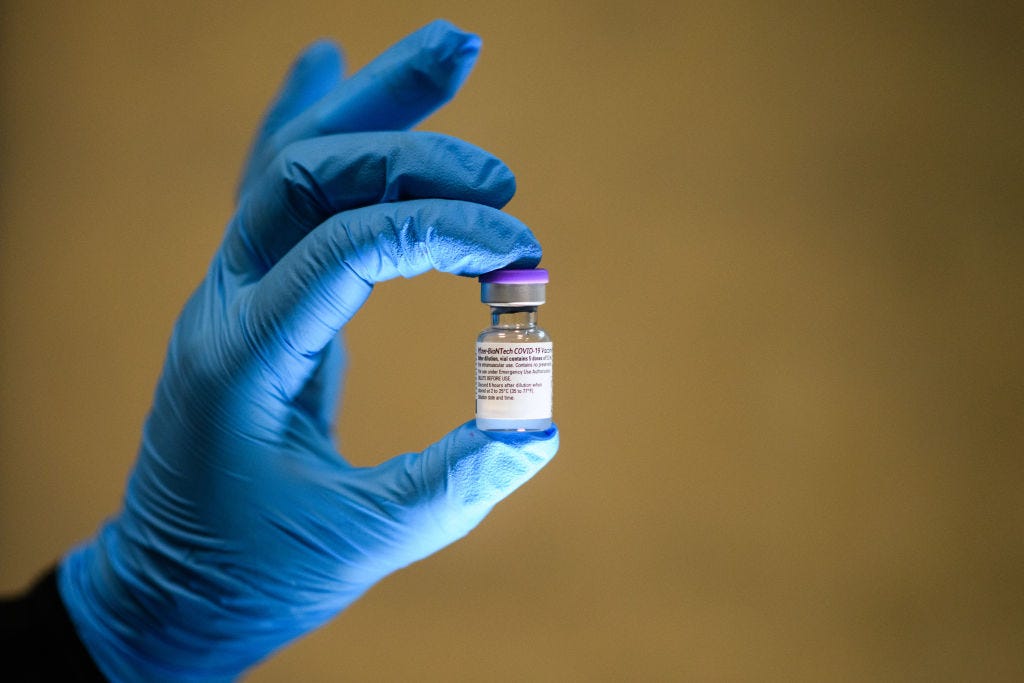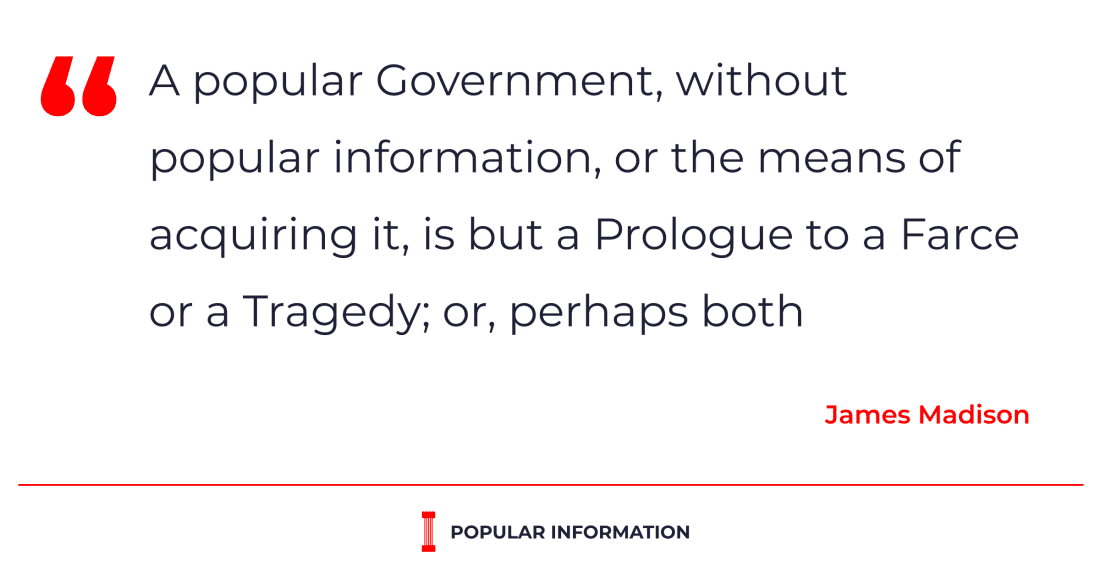The Pfizer vaccine is being rolled out across the country and the initial distribution, by all accounts, is orderly. The vaccine is being distributed to hospitals, which are offering the shots to medical personnel and residents of long-term care facilities. There are about 17.6 million Americans who are eligible for the vaccine in this phase, known as Phase 1A. It will take several weeks, at a minimum, to serve everyone in this group who wants a vaccination.
Phase 1B is where things get tricky.
That's when vaccines will be made available to "essential workers." This is a much larger group that includes more than 80 million Americans. What jobs are considered essential? Some categories are uncontroversial. Few people would dispute that supermarket workers, firefighters, and teachers are essential. But the overall composition of the group is not well-defined. That provides an opportunity for powerful industries to lobby for early access.
Further complicating matters is that, while the federal government issues guidance, the actual prioritization plans are determined state-by-state.
The financial service industry, for example, has been lobbying for its workers to be considered essential. Some workers in the industry, like bank tellers, are exposed to the public. But some states, like California, have been convinced to include a much larger group of financial workers, including anyone needed to “maintain orderly market operations.”
Well-connected businesses — especially generous campaign donors — have shown the ability to have their employees deemed "essential." In Florida, for example, WWE professional wrestlers were designated "essential" by Governor Ron DeSantis (R), allowing them to be exempt from pandemic restrictions and continue to perform. Vince and Linda McMahon, who own the WWE, have donated millions to Trump and other Republican politicians. It is not clear whether WWE wrestlers will get priority access to a COVID vaccine.
The next stage of distribution, Phase 1C, has more opportunity for abuse by the rich and powerful. In Phase 1C, vaccines will be made available to adults with medical conditions that put them at "high risk." Depending on the state, smokers, people with moderate-to-severe asthma, and people with high blood pressure could be included.
There are around 100 million Americans with conditions that could be considered "high risk." This means that the distribution of the vaccine will, by necessity, be much less centralized than it is now. The doctors and pharmacists who dispense the vaccine will not be able to independently verify the claims of each person. It will rely, for the most part, on the honor system.
This "leaves room for a doctor to, for example, portray a patient’s mild asthma as severe enough to justify early access to a vaccine." Some investment firms employ their own doctors to conduct physicals and tend to the health of their top employees. These companies could route vaccinations through these doctors, securing early access for CEOs and other executives. WorldClinic, a concierge medical practice that costs up to $250,000 annually, has been receiving multiple inquiries every day since Thanksgiving on how patients can secure early access to the vaccine. A WorldClinic doctor told Stat News that it would not help patients cut in line.
On thin ice
Last week, reports began to circulate that the NHL was planning to purchase vaccines in advance of its season in January. According to Canadian sportscaster John Shannon, a “source confirms that the NHL is planning the private purchase of a COVID vaccine for all constituents involved in the potential upcoming season.”
The tweet, expectedly, drew criticism from many. Ninety minutes later, Shannon clarified that the NHL will be securing the vaccine “when and if it's available for private purchase” and that “the league also is adamant they would not jump the line to do so.” But with the start of the season just a month away, it’s evident that the league was attempting to secure some preferential treatment for its players and staff.
This isn’t the first time the NHL tried to cut in line for a vaccine. In 2009, the Canadian government investigated NHL team Calgary Flames after “150 Calgary Flames players, family members and staff got the 2009 pandemic flu shot at a satellite clinic set up just for them, even as public H1N1 supplies grew scarce,” reports The Vancouver Sun.
Needless to say, professional athletes are not essential workers. Yet, throughout the pandemic, their status has granted them privileged access to health care services that most cannot receive. We’ve seen this with COVID testing: back in March, the Daily Beast reported that “the Utah Jazz alone consumed 20 percent of Oklahoma’s total stock,” despite there being a shortage. Over the summer, the Los Angeles Times pointed out that hundreds of MLS players and staff were tested daily and received test results in hours.
Still, much remains to be known about how the allocation of vaccine doses will play out. This week, NFL commissioner Roger Goodell said that the league was not planning to vaccinate players and personnel ahead of the Super Bowl in February. The NBA said it plans “to respect whatever guidelines and criteria are enforced by the government and medical agencies concerning which populations will receive a vaccine early,” reports ESPN.
Trump acolytes get access to rare antibody treatment
Before a vaccine was approved, powerful people have used their connections to secure access to rare COVID-19 treatments. Several top Republicans who contracted COVID, including Trump, received an effective monoclonal antibody treatment that is in extremely short supply. Trump was one of the first ten people to receive the treatment outside of a clinical trial — before it was approved for emergency use.
Trump responded well and, since then, many of his top allies — including Chris Christie, Rudy Giuliani, and Ben Carson — also secured access to the antibody treatment after contracting the virus. Giuliani acknowledged he received better care because he is famous. "Sometimes when you’re a celebrity, they’re worried if something happens to you they’re going to examine it more carefully, and do everything right," Guiliani said. Christie, who contracted COVID before the antibody treatment was cleared for emergency use, was offered a spot in a clinical trial. He turned that down because he was worried he would receive a placebo but was able to receive the antibody cocktail anyway. Carson said that Trump personally intervened to secure him access to the treatment.
For everyday Americans, the antibody treatment is much more difficult to secure. Most hospitals do not have nearly enough supply to meet the demand, and are forced to ration it. Some facilities determine who receives the treatment by lottery.
Top White House staff was scheduled to be "among the first wave of people in the United States to receive coronavirus vaccinations," even though they did not meet the federal government's criteria in Phase 1A. The plan was delayed following a wave of negative press coverage.
Who is left behind
Currently, vaccine supply is scarce. This means that as powerful groups wield their connections to lobby for priority access, some of the most vulnerable populations risk being pushed further back in line.
Consider incarcerated populations: since March, the largest outbreaks across the nation have consistently been in correctional facilities. At least 257,708 prison inmates contracted the virus and more than 1,580 have died, according to the COVID-19 Behind Bars Data Project at UCLA School of Law. With the “COVID-19 mortality rate within prisons...twice as large as the mortality rate for the general population,” incarcerated populations should be among the most prioritized groups for receiving the vaccine.
But only six states so far have specifically included incarcerated people in their Phase 1 plans, the Prison Policy Initiative finds. On a national level, the situation looks more grim. In November, the Associated Press reported that the Federal Bureau of Prisons, one of the first government agencies to receive the vaccine, is reserving its vaccines for staff, not inmates –– ”even though sickened prisoners vastly outnumber sickened staff.”




